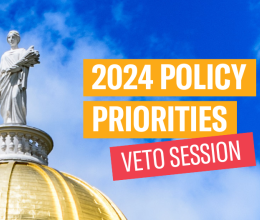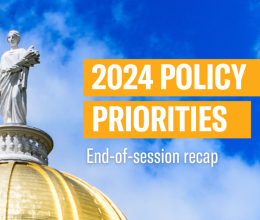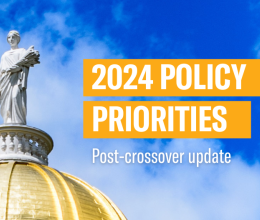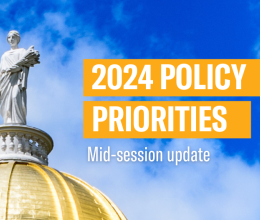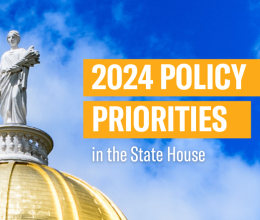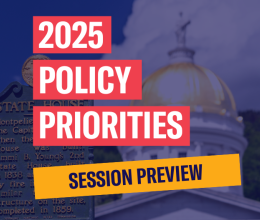
A few weeks ago, we provided an update on bills to watch as we approached “crossover” in Vermont’s 2023 legislative session. Crossover is the deadline for bills to move from one legislative chamber to the other in order to be passed into law that same year. Since 2023 is the first of a two-year legislative biennium, bills that did not make the crossover deadline can still be worked on but won't be able to pass through the whole legislature until next year. (To see where we started, read about our legislative priority bills as they stood at the opening of the biennium).
Now that the dust has settled and we have approximately six weeks left in the session, here’s where several key pieces of legislation stand. Your voice is important! Click on ACT NOW links below to contact legislators about priority legislation in the coming weeks.
On the Move
Shield laws protecting patients and providers engaged in reproductive or gender-affirming care (H.89 and S.37) - ACT NOW
Taken together, these bills offer key provisions to protect patients and providers engaged in legally-protected reproductive and gender-affirming health care. H.89 passed the House in February and will be taken up by the Senate Judiciary Committee soon, and S.37 passed the Senate in time for the crossover deadline. We expect to see both bills pass this legislative session, further securing our right to access essential health care and offering providers and patients with protection from unjust out-of-state civil or criminal liability.
Update, April 27, 2023: Vermont's shield laws, H.89 and S.37, have officially passed in both the House and Senate. Next they will go to Governor Scott-, who has signaled support for both bills-, to be signed into law. Thank you to everyone who contacted their legislator to help advance this critical legislation!
“School safety” bill (S.138)
Children need our support, not to be treated as potential threats to be monitored and investigated. We are grateful that the Senate Education Committee amended S.138 to remove the mandatory threat assessment teams proposed by the Scott administration. Instead, the bill will require schools with threat assessment teams to engage in bias training and collect data to help identify discriminatory impacts—making this bill a strong improvement on the status quo.
This is a huge victory for the privacy and due process rights of our youth, and we hope that data collected over the course of this year will help shape thoughtful and equitable policy in the future. The bill passed out of the Senate and will now go to the House for further consideration.
Reducing the imposition of cash bail (S.27)
Cash bail requirements hold people in prison before they’ve even had a trial, simply because they are unable to afford to pay for their freedom. As expected, the Senate passed an amended version of S.27 that further limits the ability to impose cash bail for misdemeanor charges. It also requires the Vermont Sentencing Commission to produce a report by December 2023 outlining what Vermont would have to do to successfully end the use of cash bail for all charges. The bill will next head to the House Judiciary Committee.
Prevent coercive interrogations of Vermont youth (S.6) - ACT NOW
Coercive interrogation tactics are known to elicit false confessions, and youth are especially susceptible to these methods. False confessions harm not only the person who was manipulated—they also deny communities access to truthful and just resolutions. Though we had hoped to see the lawmakers eliminate the use of deceptive and coercive interrogation tactics on anyone in Vermont, the Senate made important progress towards this goal by passing S.6. This bill would end the use of these manipulative interrogation tactics on people under the age of 22. The House Judiciary Committee will be the next to review the bill.
Capital spending bill - ACT NOW
Many provisions are included in the capital spending bill each year, and we were keeping a close eye on the designation of funds towards prison construction and expansion in this year’s budget. The House Corrections and Institutions Committee ultimately approved a $15.5 million expenditure towards prison site selection and planning in their version of the capital bill.
Alongside our allies, we successfully advocated for key investments that will help improve conditions of people living and working in prisons today. The spending bill also compels the Department of Corrections to provide a clear recommendation of the total number of beds it expects to build as a part of new prison construction before the next legislative session, which will impact future policymaking and spending on this prison project.
In the final day of debate, several members committed to creating a working group through S.14 (a Senate bill related to criminal legal reforms) that would study the questions we raised about how our state can invest in alternatives to our over-reliance on incarceration. We will do everything that we can to ensure the state studies both existing community-based alternatives to incarceration and how many people could be better served in these settings before moving forward with prison construction.
Missed the crossover deadline
Bills that miss the crossover deadline can’t pass the legislature this year, but because this is the first year of Vermont’s two-year biennium, legislators can still lay the groundwork to help these bills pass when they convene next year. We will advocate for committees to take testimony on these important bills this spring so that they can advance in 2024.
Limiting unnecessary traffic stops (H.176) - ACT NOW
H.176 would address overpolicing and advance racial equity by limiting law enforcement's ability to pull over drivers for "non-public safety" reasons such as an expired registration, obstructed license plate, or broken taillight. Black drivers are more likely than white drivers to be pulled over for minor traffic offenses that do not affect the safety of other motorists. Placing stronger limits on the broad authority we have ceded to our law enforcement agencies — particularly in policing our roadways — can be one of the most direct ways to further racial justice in our state. We hope to see the House Judiciary Committee schedule a hearing on this important piece of legislation this year.
Civilian Oversight of Law Enforcement (S.75)
By empowering community members to participate in police oversight, municipalities can foster greater transparency, accountability, and trust. This kind of civic participation lends much-needed checks and balances to the relationship between police departments and the people they serve. As introduced, S.75 would remove a major hurdle to meaningful community oversight of police by authorizing municipalities to create civilian oversight boards without undergoing a charter change. To date the bill has received one hearing in the Senate Government Operations Committee. We hope it will be passed by the full Senate before the end of the session.
Building a Public Health Approach to Substance Use (H.423 and S.119)
Drug overdoses killed a record number of Vermonters in 2022. But instead of focusing all available resources on reducing the potential harms of substance use, Vermont continues to treat substance use disorder as a criminal offense. Two bills, H.423 and S.119, would take significant steps toward building a more robust system of care for Vermonters with substance use disorder, and better protect our neighbors from accidental overdose by decriminalizing the personal possession of drugs. These bills have yet to receive a hearing, but we hope the legislature will carefully examine these proposals in the second half of the session—because we should not put people in handcuffs in order to get them help.
What’s next?
As we head into the final weeks of this year’s legislative session, we will be working with our legislative and community allies to ensure that these bills are as strong as possible and that they make it over the finish line.
Take action here. Then, sign up for email alerts and follow us on Instagram, Twitter, and Facebook to stay up to date on the latest opportunities to get involved in our work and make your voice heard.
